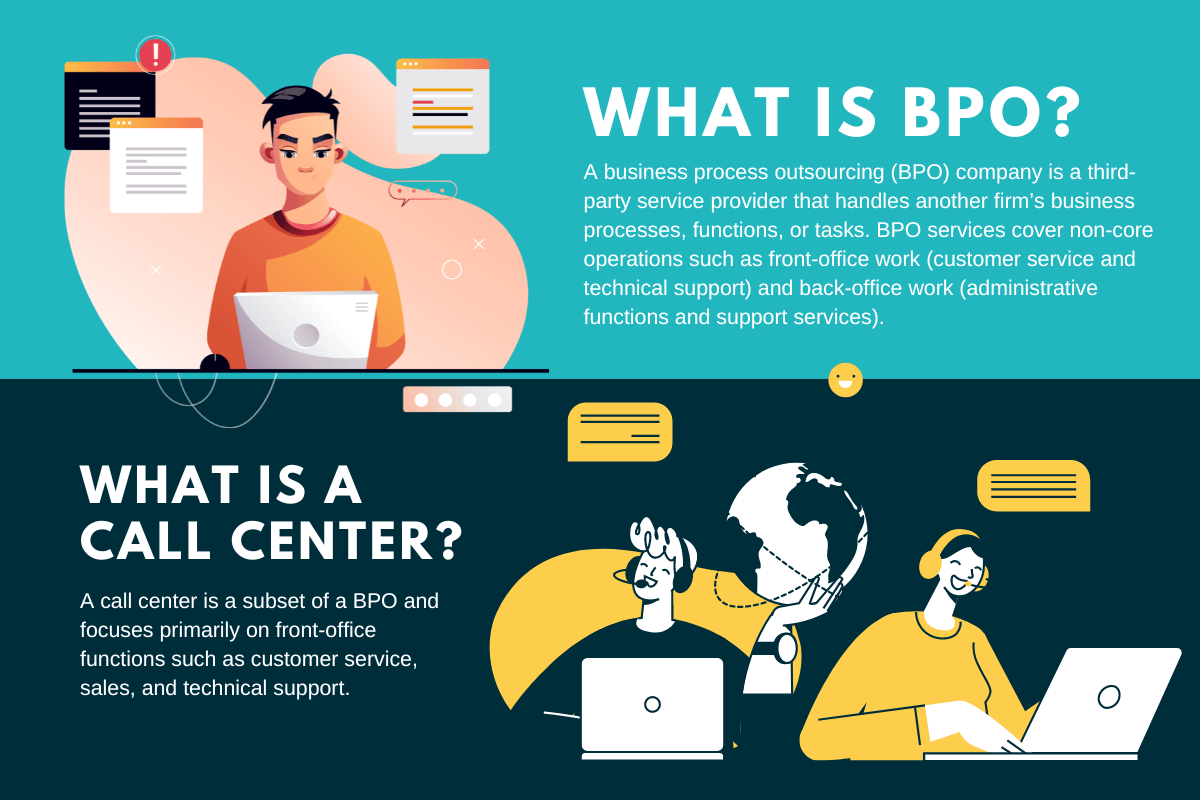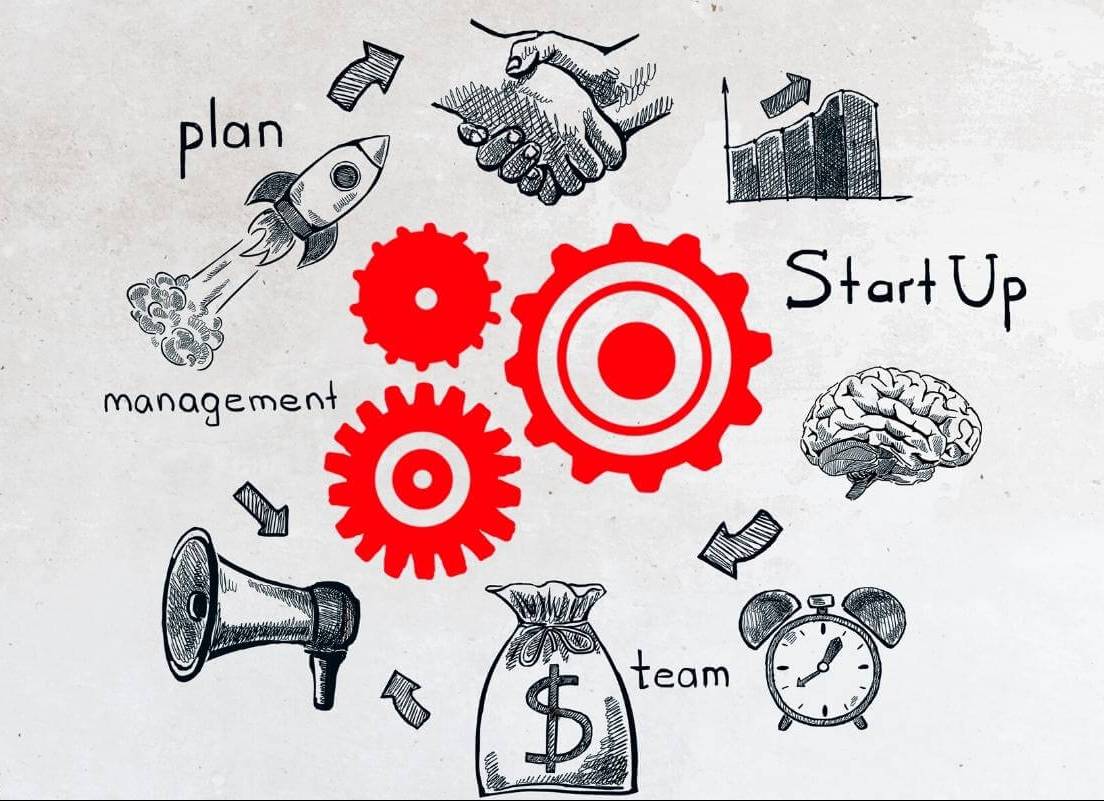Written by Dion Jay Tality
Contents
Businesses of all sizes must consistently optimize their processes. However, some confront challenges in handling their front- and back-office functions. They lack the workforce, technology, and resources necessary for continuous operations.
Outsourcing is a viable solution for boosting business processes. This growing business strategy helps reduce operating costs, access a global workforce, and leverage technology and resources. That’s where a business process outsourcing (BPO) company enters the picture.
This article covers what a BPO company is. Learn what business functions BPO service providers handle and how to get started with outsourcing.
What Is a BPO Company?

A business process outsourcing (BPO) company is a third-party service provider that handles another firm’s business processes, functions, or tasks.
BPO services cover non-core operations such as front-office work (customer service and technical support) and back-office work (administrative functions and support services).
Hiring a BPO provider means entrusting parts of your business operations to an external vendor. Generally, it starts with a business needing help to handle some business functions. After investigating prospective service providers, this business signs a contract with a BPO company.
BPO companies have tangible and intangible resources required for running a successful business – and to helping yours. First, they hire and train people to build their workforce. They also invest in vital business operations tools, technology, and resources. Lastly, they have the experience and expertise in keeping a business up, running, and fully operational.
BPO has been a growing industry. What started as a business solution for manufacturing and a business strategy in the 1980s has become a robust sector today. Grand View Research reports that the global BPO market was worth almost $246 billion in 2021. It might reach $525.2 billion by 2030.
Outsourcing became a vital part of the business sector and the economy in the 1990s. The BPO sector is notable for its call centers worldwide, so people tend to use “BPO” and “call center” interchangeably. But today, BPO providers offer many other services to prospective clients due to their growing scope of work.
What Is the Difference Between BPO and a Call Center?
Business process outsourcing is a broad term, and a call center is only a subset of this industry. As explained above, a BPO service provider can handle front- and back-office work.
Front-office functions such as customer service, sales, and technical support are ideal for call centers. However, other functions, such as outsourcing finance and accounting, a back-office function, obviously do not apply to a call center. BPOs also handle back-office functions such as data entry.
What Business Functions Do BPO Companies Handle?

The BPO sector provides a vast scope of services. Companies can outsource one specific function or several of their business operations.
Commonly outsourced functions are customer service handled mostly by call centers. ReportLinker said that the global call center market was worth $339.40 billion in 2020 amid the pandemic. It might hit $496 billion by 2027 with a compound annual growth rate (CAGR) of 5.6% from 2020 to 2027.
BPO is also famous for its IT support services for back-office work. The IT segment holds the largest revenue in the industry, and its global outsourcing market might hit $395 billion this year.
The BPO industry covers many other business operations, as discussed below.
Front Office
This operation covers client-facing tasks, which means that BPO agents interact with customers directly.
- Customer Service: At a BPO provider, customer service representatives assist customers via phone calls, chat, or email. They usually answer questions, process requests, provide updates, handle complaints, and manage disputes.
- Technical Support: Technical support specialists in a BPO company help customers with technical problems or issues. A perfect example is when they assist customers in fixing mobile phones or repairing personal computers.
- Sales or Telemarketing: Telemarketers in a BPO company directly contact customers to sell products or services. Their ultimate goal is to convert sales or acquire new customers.
Back Office
This operation isn’t client-facing, and BPO agents work behind the scenes to help your company manage business processes, providing support to front-office personnel.
- Accounting and Finance: BPO service providers have certified accountants and use accounting software. They perform financial management functions, primarily bookkeeping and accounting. In some cases, they handle payroll as well.
- Data Entry: BPO companies hire employees to work as data entry specialists. These specialists primarily encode information into a computer. But they also organize, manage, and protect that information.
- Information Technology (IT) Support: BPO service providers employ IT experts with industry experience and field specialization. They handle IT support services such as network management, software updates, hardware maintenance, and troubleshooting.
- Real Estate Back-office Operations: BPO companies have realtors and administrative assistants for back-office tasks. These tasks include property listings, open-house scheduling, document processing, and even real estate accounting.
- Property Management: BPO companies employ property managers tasked with managing rental properties. They perform back-office tenant screening, property maintenance, and rental payment management.
How Do You Get Started With Outsourcing?

Start with outsourcing by identifying where to outsource your functions best. Here are the three basic outsourcing types based on location:
- Offshoring involves outsourcing to an overseas BPO service provider. Your U.S.-based e-commerce business can outsource sales and telemarketing to a variety of geographic locales.
- Onshore outsourcing involves contracting with another company in the same country. In domestic outsourcing, you hire a BPO provider for your business in the same country.
- Nearshore outsourcing involves working with a BPO company in a nearby country. For example, your Canada-based business can outsource bilingual customer service to a provider elsewhere in North America or in South America.
Outsourcing applies to businesses of all sizes. In the past, only big companies and large corporations hired BPO companies. Recently, small businesses have started to outsource. Nearly two-fifths of small companies entrusted one of their business functions to a third-party service provider in 2019.
Additionally, startups are the new BPO customers. This BPO trend kicked off this year and might continue in the coming years. It makes sense because BPO service providers can help startups scale and grow.
Based on your business size, here’s how you can start outsourcing.
Startups
Startups usually don’t have enough human resources and materials. Several parts of their business operations require a workforce, tools, equipment, technology, and more. Working with a BPO service provider to handle some business functions while focusing on core operations helps startups stay focused.
Assess your business needs and pain points as a startup. See what non-core business aspects you can outsource and look for the right BPO company. That way, you can ensure positive business outsourcing results for your startup.
SMEs
Small and mid-sized enterprises are looking to grow and expand over time. Working with BPO service providers can be a practical approach. BPO companies usually have industry experts and the latest technologies to scale a business.
Sit down and plan how to grow your small or mid-sized business. Check what business functions require solid staffing and technological resources. From there, look for a BPO company best suited for your business type, size, and industry.
Big Companies
Large companies can benefit from outsourcing as well. They often need external vendors to handle growing business needs.
Third-party service providers usually have BPO learning centers. Their learning centers help train their workforce, boost their knowledge, and hone their skills, so that their workforce is always up-to-date for clients’ needs. As a client, you can capitalize on the expertise and experience of your hired BPO provider.
Start by evaluating your business needs and identifying business operations to outsource. Be highly critical in your selection process for a BPO service provider. If you’re looking to kick your business up a notch, hire a BPO company best suited for your business.
The Bottom Line
Business process outsourcing is no longer simply about finding a service provider to handle non-core operations for businesses. BPO companies mean more because they are business partners that participate in the decision-making process and contribute to overall success.
Understanding what a BPO company is and how it can help your business is crucial. It makes even more sense to consider BPO for long-term planning and implementation. Before outsourcing, assess and identify what business functions to outsource, whether back- or front office. Most importantly, select a third-party service provider best suited for your business.
When looking for one, consider these key factors: experience, workforce, technology and resources, pricing, and reputation. By informing yourself of these qualities, you’ll tie the knot with the right BPO provider for your company.




